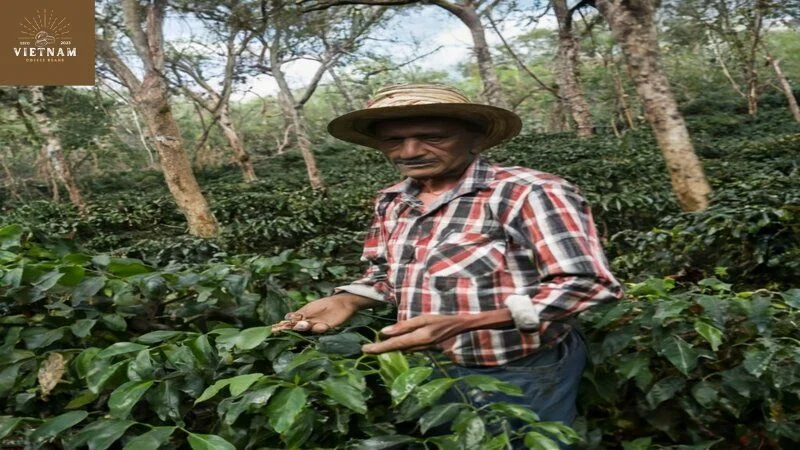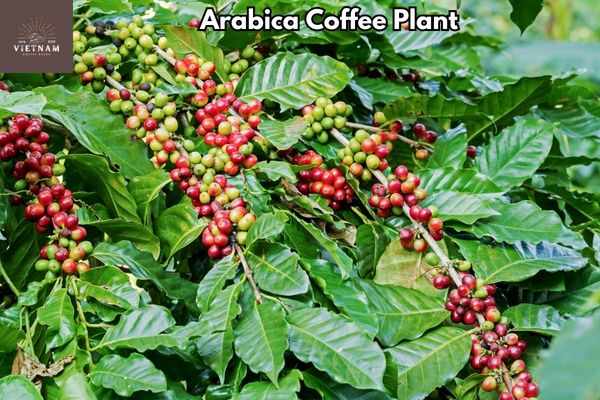Top Arabica Coffee producing countries, with Brazil as the top producer and exporter, significantly impacting the world’s Robusta and Arabica coffee output. Brazil’s vast plantations and climate contribute to its leading role. Ethiopia, known as the origin of coffee, and Colombia, famous for its smooth Arabica, are also major players in Arabica production.
Vietnam, primarily a Robusta producer, is now gaining recognition for Arabica, while Honduras’s Arabica production has made it a top exporter. Germany and Belgium, though not coffee growers, are crucial in the coffee trade due to their roles in processing and re-exporting. Nations like Guatemala, Peru, and Indonesia are integral to the Arabica industry, shaping global market dynamics and consumer trends, despite challenges like climate change and coffee rust.
15 Top Arabica Coffee producing countries & Coffee Harvest
Top coffee producing countries: Arabica beans from Brazil lead the global market, reflecting the state’s vast, fertile landscapes and advanced cultivation techniques. Moving to Africa, Ethiopia, renowned as the birthplace of coffee, boasts a rich variety of Arabica beans, each imbued with unique flavors and aromas shaped by the region’s diverse climates.
Costa Rican republic, in Central America, benefits greatly from its volcanic soil, yielding a cherished Arabica coffee known for its rich quality. Colombia, another key player, maintains its position in the top 15 due to its ideal coffee-growing conditions, producing sought-after beans with a smooth, mild flavor.
Alongside these countries, Guatemala, Honduras, Peru, and others contribute significantly to the global Arabic coffee scene, with their arabica coffee cultivation periods and cultural practices adding to the complexity and richness of flavors. Vietnam, known for its focus on robusta coffee, is also emerging in the specialty coffee market with its growing Arabica cultivation. Together, these 15 countries in the world weave an intricate tapestry of Arabica coffee manufacture, offering a diverse range of flavors and stories to coffee lovers worldwide.
Brazil is the world’s top coffee-producing countries
Brazil, the Federal Republic of Brazil, is the largest country in South America, with a population exceeding 214 million. It stands as the fifth largest country globally in terms of both area and population. Notably, Brazil is the only Portuguese-speaking nation in the Americas. Renowned for its passion for football, Brazil has a rich footballing tradition and has produced numerous world-class players.

Moreover, Brazil holds a prominent position in the global coffee industry. It serves as the largest producer and exporter of coffee worldwide, with its Arabica coffee being highly regarded. Impressively, Brazil accounts for 41.7% of global coffee manufacture, with an Arabica output of 39.9 million bags or 2.39 million tons. The success of Brazil’s coffee business can be attributed to its favorable climate and diverse coffee-growing regions.
Brazilian coffee is known for its exceptional quality, enticing aroma, and full-bodied flavor. The coffee sector in Brazil is expansive and significantly contributes to the state’s economy, supporting numerous farms, cooperatives, and exporters. The demand for Brazilian coffee extends beyond national borders, with coffee enthusiasts and businesses worldwide seeking out its beans. These beans are used in various applications, including specialty coffee blends, espresso, and other popular coffee beverages.
Colombia is the second coffee cultivation
Production of Arabica coffee in Colombia is a biodiverse country with stunning landscapes and diverse ecosystems. Its unique position as the only South American country with coastlines on both the Atlantic and Pacific Oceans sets it apart. The country is renowned for its high-quality Arabica coffee, contributing 14.9% to global coffee plantations.

Colombian coffee is celebrated for its exceptional taste, thanks to diverse microclimates, and fertile volcanic soils. The coffee business plays a vital role in the country’s economy, supporting farmers and local communities. Colombian arabica coffee beans is highly sought after worldwide, known for its distinctive flavors and exceptional quality. The country’s commitment to sustainability and ethical practices further enhances its reputation.
Ethiopia at third place in producing coffee
Ethiopia, a landlocked country in the Horn of Africa, is renowned for its rich cultural heritage and diverse landscapes. With a population exceeding 109 million, it is the 12th most populous country globally and the second-largest in Africa.

Ethiopia holds a prominent position in the global coffee business, producing approximately 7.35 million bags of Arabica coffee, accounting for 7.7% of global production. Ethiopian Arabica coffee is highly regarded for its distinctive flavors, ranging from fruity to earthy, and its coffee-growing regions, such as Sidamo and Yirgacheffe, are internationally acclaimed.
Coffee plays a vital role in Ethiopian culture and the economy, with coffee ceremonies being a cherished tradition. The country promotes sustainable and fair trade practices in the coffee sector, ensuring the well-being of coffee farmers and fostering high-quality production. Ethiopian Arabica coffee enjoys great popularity among coffee enthusiasts worldwide, thanks to its exceptional taste and rich history.
Honduras
The Republic of Honduras, historically referred to as Spain-Honduras is located in Central America. Honduras is renowned for its substantial Arabica, which amounts to 6.5 million bags or 390,000 tons, making up approximately 6.8% of global coffee plantations.
The state’s favorable climate and geographical conditions provide an ideal environment for cultivating high-quality coffee beans. Honduran coffee, known for its unique flavors and characteristics, contributes significantly to the global coffee business. The nation’s coffee plantations play a vital role in its economy, showcasing Honduras as an important player in the world of coffee.
Peru – Arabica coffee growing country in 5th place
Peru, a multi-ethnic country with a population of 30.4 million, is known for its vibrant cultural fabric. The diverse ethnic composition includes indigenous peoples, those of European descent, Africans, and Asians. Spanish serves as the primary language, while indigenous languages highlight linguistic diversity. Peru’s cultural traditions encompass art, cuisine, literature, and music, blending indigenous, European, African, and Asian influences.

Peruvian art showcases craftsmanship inspired by ancient civilizations, and its cuisine combines indigenous ingredients with international flavors. Renowned writers like Mario Vargas Llosa and Ciro Alegría have contributed to Peru’s literary heritage. The state’s music reflects indigenous roots, with traditional Andean melodies and Afro-Peruvian rhythms. Peru’s favorable climate and geography make it a significant producer of high-quality Arabica coffee, representing around 4.7% of global production.
Mexico
The United States of Mexico, a federal republic in North America, is a geographically expansive country spanning over 1.9 million square kilometers. With a population of approximately 106 million, it ranks 11th globally.
Mexico is also a notable producer of Arabica coffee, with an annual production of 4.35 million bags or 261,000 tons, accounting for about 4.5% of the global coffee manufacture. The state’s coffee business holds significant importance both domestically and internationally, contributing to its agricultural and economic landscape.
Guatemala
The Republic of Guatemala, located in Central America, is a country known for its rich cultural heritage. Guatemala is also a notable producer of Arabica coffee, with an annual production of 3.5 million bags or 210,000 tons, accounting for approximately 3.7% of the global coffee manufacture.
The state’s favorable climate and volcanic soil create ideal conditions for cultivating high-quality coffee beans. Guatemalan coffee is highly regarded for its distinct flavors and is an important part of the state’s agricultural sector and economy.
China Arabica Coffee
The People’s Republic of China, located in East Asia, is not only the most populous country globally, with an estimated population of 1.4 billion, but also a significant player on the world stage. Covering an extensive land area of 9.59 million square kilometers, China ranks as the fourth largest continental country.

Its vast territory includes a coastline stretching over 14,500 km along the Pacific Ocean, bordered by the Bohai, Yellow Sea, East China Sea, and South China Sea. Despite not being traditionally known for coffee manufacture, China contributes to the global coffee business, producing 2.3 million bags or 138,000 tons of Arabica coffee, representing approximately 2.4% of global coffee manufacture.
Nicaragua – Arabica coffee growing country in 9th place
Nicaragua, a republic in Central America, holds the distinction of being the largest country in the region while maintaining the lowest population density. With a population comparable to its smaller neighboring countries, Nicaragua’s expansive land area provides ample space.

The country is also a notable producer of Arabica coffee, contributing 2.3 million bags or 138,000 tons to the global coffee production, which accounts for approximately 2.4% of the total. Nicaraguan Arabica coffee is exported worldwide, showcasing the state’s role in the international coffee market.
Costa Rica
The Republic of Costa Rica, located in Central America, is renowned for its commitment to peace and disarmament. It holds the distinction of being the first country to disband its regular armed forces as mandated by its constitution.

In addition to its dedication to peace, Costa Rica is also a notable producer of Arabica coffee. With an annual production of 1.38 million bags or 82.5 thousand tons, Costa Rican Arabica coffee represents approximately 1.4% of global coffee manufacture. The state’s high-quality coffee beans are enjoyed worldwide, contributing to its agricultural and economic sectors.
Indonesia
The Republic of Indonesia, an archipelagic nation situated between Southeast Asia and Oceania, is widely known as the “Land of a Thousand Islands” due to its vast collection of 13,487 islands. With an estimated population of over 274.1 million as of 2020, Indonesia ranks as the fourth most populous country globally and the third in Asia.
In addition to its cultural and geographic diversity, Indonesia contributes to the global coffee business as a producer of Arabica coffee. Producing 1.25 million bags, equivalent to 75,000 tons, Indonesian Arabica coffee accounts for approximately 1.3% of the global coffee production.
India
The Republic of India, located in South Asia, is a sovereign nation renowned for its vast size and population. Covering the seventh-largest land area globally, India is also the second most populous country, with over 1.36 billion inhabitants. In addition to its diverse cultural heritage, India contributes to the global coffee business as a producer of Arabica coffee.
With an annual production of 1.25 million bags, equivalent to 75,000 tonnes, Indian Arabica coffee accounts for approximately 1.3% of the global coffee production. India’s coffee beans are enjoyed worldwide, reflecting the state’s significance in the international coffee market.
Vietnam – 13th Arabica coffee exporters
The Socialist Republic of Vietnam, situated in the easternmost part of Southeast Asia on the Indo-Pacific Peninsula, shares borders with Laos, Cambodia, China, the South China Sea, and the Gulf of Thailand. While Vietnam holds the distinction of being the world’s largest producer of the coffee, it ranks 13th in terms of Arabica coffee production.

Vietnam contributes 1.12 million bags, equivalent to 67.2 thousand tons, of Arabica coffee to global production, accounting for approximately 1.2% of the total Arabica coffee output worldwide. The state’s significant role in the coffee business highlights its prominence as a key player in the global market.
Papua New Guinea
Papua New Guinea, an archipelago state in Oceania, is known for its cultural diversity and over 850 indigenous languages. Despite a population of about 5 million, the country has a predominantly rural population, with only 18% living in urban areas.
Papua New Guinea remains one of the least explored countries, both geographically and culturally, with unique flora and fauna. It produces 0.85 million bags (51,000 tonnes) of Arabica coffee, representing approximately 0.9% of global production.
Kenya
The Republic of Kenya, located in East Africa, is a culturally diverse country with vibrant representations of various communities. From the Swahili culture along the coast to nomadic communities in the north and several others in the central and western regions, Kenya showcases a rich tapestry of traditions.
Agriculture plays a crucial role in the country’s economy, with 85% of the population relying on this sector. Kenya’s agricultural products include wheat, corn, millet, potatoes, bananas, coffee, tea, cotton, and sugar. In terms of coffee production, Kenya contributes 0.78 million bags or 46.5 thousand tons of Arabica coffee, accounting for approximately 0.8% of the global Arabica coffee production.
Top 5 best Coffee Exporters trade in the World 2024
In 2024, the global coffee trade will be dominated by key players. Brazil leads as the top producer, known for its significant export of metric tonnes of coffee, and is a standout among the top 10 coffee producing countries. Vietnam makes its mark with its robust coffee, while Germany significantly contributes to processing and distribution, asserting its role in the coffee sector despite not growing coffee.
Colombia is renowned for its high-quality Arabica coffee, including specialty Arabica, highly valued in the specialty coffee market. The United States influences the global scene with its extensive coffee consumption and green coffee imports. Meanwhile, Vietnam excels in the coffee production sought after for its unique coffee beans.
Countries like Uganda are emerging as significant producers of Arabica coffee, particularly in regions like Mbale, Bugisu, Lira, Gulu, and Jinja. Similarly, Peruvian coffee from the southwestern regions has seen growth since its late 19th-century introduction. This diverse production landscape, from established regions like Brazil and Colombia to newer areas in Africa and Asia, shapes the dynamic 2024 global coffee economy.
Brazil
Brazil, a coffee production powerhouse, stands out as the world’s largest coffee producer, single-handedly contributing nearly 40% of the global coffee supply. Its favorable climate makes many areas of Brazil ideal for coffee cultivation, with coffee plantations spanning approximately 27,000 square kilometers, primarily in Minas Gerais, São Paulo, and Parana.
Unlike most other countries that manufacture coffee, Brazil employs a unique method where the coffee cherries are dried in the sun rather than washed (unwashed coffee). Such is Brazil’s influence in the industry that the 60-kilogram burlap sacks once used to export Brazilian coffee beans continue to serve as the global benchmark for measuring coffee production and trade.
Vietnam
Vietnam has carved a niche in the international market by specializing in the production of affordable the beans. Known for their higher caffeine content, the beans offer a more bitter taste compared to Arabica beans. Coffee cultivation in Vietnam experienced a substantial surge in the 1990s following economic reforms introduced by the communist government, known as Đổi Mới.
As a result, Vietnam currently contributes over 40% of the global bean production. Notably, coffee farming in Vietnam is highly lucrative, with significantly higher yields compared to other major countries that manufacture coffee.
Colombia
Colombia, as one of the top countries that manufacture coffee, has gained recognition for its high-quality Arabica coffee. With its aromatic, mild, and fruity flavors, Colombian coffee is highly sought after worldwide. The country’s production spread across 10 specific regions, contributes significantly to the global coffee market. While Colombia excels in Arabica production, other countries like Uganda and Peru specialize in specialty arabica coffee, respectively. Costa Rica and Guatemala have also overcome past challenges to develop a thriving coffee business.
Indonesia
Indonesia is known for being one of the top countries that manufacture coffee in the world, offering exceptional and rare coffees like Kopi Luwak. This unique coffee is made from beans consumed and excreted by the Asian civet cat. Due to its distinctive production process, Kopi Luwak is highly coveted and can be quite expensive. Indonesia’s coffee production, encompassing arabica varieties, significantly contributes to the global coffee market. The country boasts rare coffee trees and numerous coffee farms across its regions. With a long history of coffee production dating back to the Dutch colonial era, Indonesia is now a leading coffee producer and plays a vital role in shaping the global coffee business alongside other coffee-producing countries in Asia and Africa.
Ethiopia
Ethiopia, known as the birthplace of Arabica coffee, produces full-bodied and earthy coffee beans that are highly regarded for their exceptional flavor. The top coffee-producing countries, including Ethiopia, are located within the “bean belt,” a region spanning the area between the Tropic of Cancer and the Tropic of Capricorn, which offers a favorable climate and growing conditions for high-quality coffee production. Arabica coffee, the most widely sold variety worldwide, is valued in cafes and restaurants across the globe. Coffee is grown in approximately 70 countries, each contributing its unique flavors and characteristics to the global coffee market. While Ethiopia is known for its Arabica coffee, other countries specialize in the coffee production.
Conclusion
Coffee is one of the world’s leading agricultural commodities, with over 60 metric tonnes produced globally each year. Brazil leads as the top coffee producer among countries around the world, contributing nearly 40% of the world’s overall production. Colombia is known for its high-quality arabica coffee, grown across 10 specific regions ideal for producing coffee with a hint of citrus acidity and full body. Ethiopia stands as the home of coffee, where arabica coffee was first introduced. Indonesia offers rare coffees like Kopi Luwak from coffee cherries consumed by civets.
Vietnam specializes in the coffee beans, making up over 40% of global beans output. Though the beans have a more bitter taste than the arabica beans preferred worldwide, they contain higher caffeine levels. Coffee is grown in around 70 countries that contribute to world markets, with the top producers located in the tropical “bean belt” region optimal for coffee crops. While global coffee production and consumption continue rising, each coffee origin imparts its own distinctive flavors and qualities.







